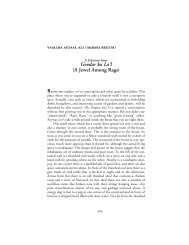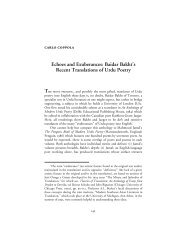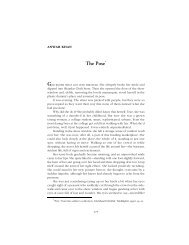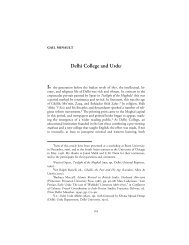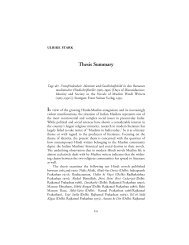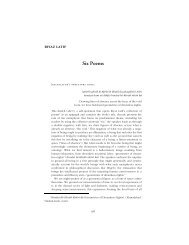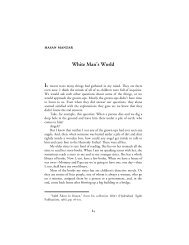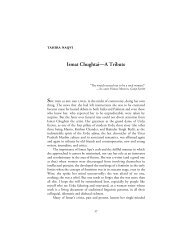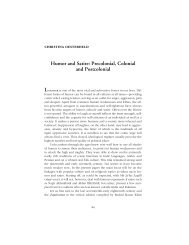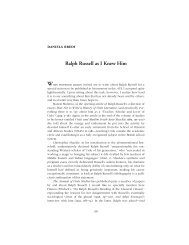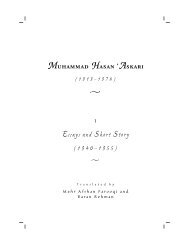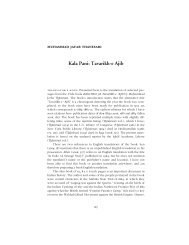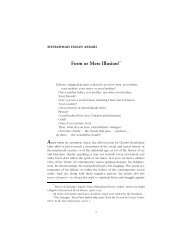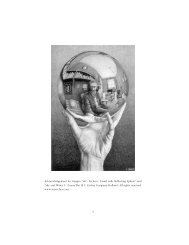Politics, Public Issues and the Promotion of Urdu Literature: Avadh ...
Politics, Public Issues and the Promotion of Urdu Literature: Avadh ...
Politics, Public Issues and the Promotion of Urdu Literature: Avadh ...
You also want an ePaper? Increase the reach of your titles
YUMPU automatically turns print PDFs into web optimized ePapers that Google loves.
ULRIKE STARK • 83by <strong>the</strong> British. AA also liked to pose as a spokesman <strong>of</strong> <strong>the</strong> Indian-languagepress <strong>and</strong> frequently took up its cause in its columns. The issue <strong>of</strong>25 August 1874, for example, carried a complaint about <strong>the</strong> government’sdouble st<strong>and</strong>ards in dealing with <strong>the</strong> English <strong>and</strong> Indian-language press,stating that it was “extremely unjust that, while Government grantsspecial indulgences to editors <strong>of</strong> English newspapers, <strong>and</strong> exalts <strong>the</strong>m tohigh <strong>of</strong>fices in <strong>the</strong> public service, it should confer no such favors on <strong>the</strong>editors <strong>of</strong> vernacular newspapers.” 46 No doubt careful sifting <strong>of</strong> AA willproduce fur<strong>the</strong>r such examples. A content analysis <strong>and</strong> assessment <strong>of</strong> itssocio-political pr<strong>of</strong>ile <strong>and</strong> public impact remains to be undertaken.Against <strong>the</strong> backdrop <strong>of</strong> Munshi Naval Kishore’s active involvement innational politics, such an investigation will also have to address <strong>the</strong> intricatequestion as to what extent <strong>the</strong> political pr<strong>of</strong>ile <strong>of</strong> AA was shaped byits proprietor ra<strong>the</strong>r than its various editors. In any case, it should be <strong>of</strong>great interest to see how <strong>the</strong> leading <strong>Urdu</strong> daily <strong>of</strong> nor<strong>the</strong>rn India waswalking <strong>the</strong> tightrope between loyalty to <strong>the</strong> colonial government <strong>and</strong> <strong>the</strong>increasing exigencies <strong>of</strong> Indian nationalism.What can be safely said at this point is that from around 1890 <strong>the</strong> circulation<strong>of</strong> AA was in decline. By <strong>the</strong> turn <strong>of</strong> <strong>the</strong> century <strong>the</strong> paper hadlost much <strong>of</strong> its former appeal. According to B≥lmukund Gupta, <strong>the</strong>influential editor <strong>of</strong> <strong>the</strong> politically trenchant Hindi journal Bh≥ratmitra,this was due to <strong>the</strong> paper’s very refusal to engage in nationalist politics. Inresisting modernization <strong>and</strong> refusing to formulate its own distinct “policy,”<strong>the</strong> veteran journalist opined, AA had failed to keep up with <strong>the</strong> tide<strong>of</strong> <strong>the</strong> times. Moreover, despite <strong>the</strong> paper’s monetary resources <strong>and</strong> itsexcellent staff, <strong>the</strong> selection <strong>of</strong> English news items was “nonsensical,” <strong>and</strong><strong>the</strong>ir translations into <strong>Urdu</strong> “barely intelligible.” Writing in 1905, Guptaconcluded: “[AA] is exactly <strong>the</strong> same as it was twenty years ago <strong>and</strong> forthis very reason it has not established a reputation for itself in <strong>the</strong> newspaperworld during <strong>the</strong>se past twenty years. Most newspaper readerswon’t even know its name.” 47 To this critical observer at <strong>the</strong> beginning <strong>of</strong><strong>the</strong> new century AA no longer met <strong>the</strong> needs <strong>of</strong> modern journalism, buthad become a “lakir ka faqir” (“lakµr k≥ faqµr”) <strong>and</strong> a “besund ka hathi”(“b®-s∑n≈ k≥ h≥t^µ”).46 SVN 1874, p. 355.47 My translation. B≥lmukund Gupta, Gupta-Nib<strong>and</strong>h≥valµ, eds. JhabarmalSharm≥ <strong>and</strong> Ban≥rsµd≥s ≤aturvedµ (Delhi: Gaurav G≥th≥ Sagam, 1994), pp.262–3.



